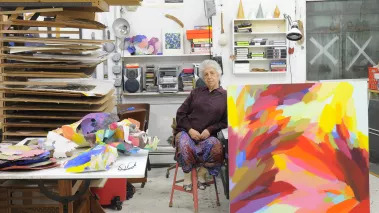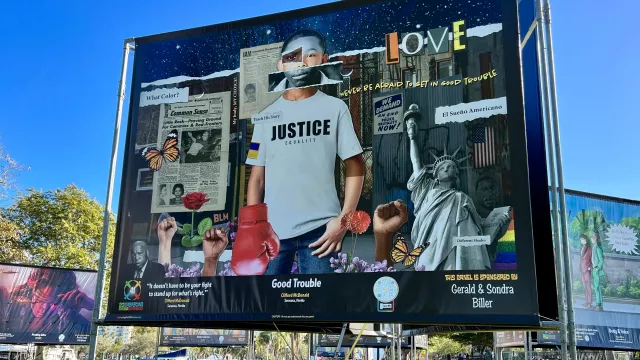Table of Contents
FIRE seeks Indiana University records on cancellation of pro-Palestinian art exhibit

Lbalbalba11122, CC BY-SA 4.0, via Wikimedia Commons
Artist Samia Halaby in her studio in 2016.
Last week, FIRE filed an open records request with Indiana University, with the goal of learning more about whether viewpoint discrimination was behind the abrupt cancellation of a pro-Palestinian art exhibit.
Before its sudden cancellation in December, the retrospective of prominent 87-year-old Palestinian artist Samia Halaby was scheduled to open Feb. 10 at IU’s Eskenazi Museum of Art.
In January, FIRE asked IU to reschedule the event, or at least be transparent about the security concerns that allegedly led to its cancellation. But the university has remained silent — even in the face of increasing public pressure to reverse course.
According to Halaby, in December, the museum director cited complaints from museum employees about Halaby’s social media criticism of Israel as grounds for the exhibit’s cancellation. But in January, when news of the cancellation went public, the university pivoted, instead claiming that “academic leaders and campus officials canceled the exhibit due to concerns about guaranteeing the integrity of the exhibit for its duration.”
At a moment of heightened tension on campus, universities need to be more protective of free expression than ever, not less.
But both explanations — depending on the specifics — present potential First Amendment concerns.
IU cannot base its decision to cancel the exhibit on some employees in the museum taking offense to Halaby’s comments on social media. As FIRE’s Jan. 19 letter argued, “To cancel Halaby’s exhibit for views she has expressed on social media concerning Israel suggests impermissible viewpoint-based discrimination,” which “risks the suppression of free speech and creative inquiry” that underlie the very purpose of college. As we wrote in our letter:
Courts have held public authorities cannot remove or censor expressive works based on viewpoint or exclude disfavored viewpoints in furtherance of the officials’ own views. Thus, while IU retains the authority to curate what it presents in its museums, it cannot exclude works based on an artist’s viewpoint.
Nor can the university cancel an exhibit simply because of non-specific safety concerns. If the university had genuine concerns that the exhibit faced some sort of security threat, it should have demonstrated why it was unable to sufficiently address that threat. Failing to do so simply incentivizes future threats to exhibits that some find objectionable.
There are extreme instances where security threats can be legitimate grounds to cancel events or exhibits. True threats, vandalism, or risk of bodily harm to attendees could form the basis of a necessary cancellation if the university cannot take reasonable precautions to ensure physical safety — such as having security present. But without further detail from the university, IU risks having effectuated a “heckler’s veto” — where an event is canceled due to a substantial disruption, or the threat of one, even though the university could take precautions to ensure the show goes on. At public schools like IU, required to honor First Amendment rights, canceling expressive events must be a last resort.

FIRE, NCAC object after State College of Florida censors art exhibit
The State College of Florida Bradenton requested a traveling art exhibition to remove pieces with the words “diversity,” “inclusion,” “justice,” and “equality."
Encouragingly, IU students and faculty members have raised free expression concerns in the wake of the cancellation. Last week, a group of about 30 students and faculty gathered on campus to voice their disapproval of IU’s administrative chilling of Halaby’s speech. And more than 100 artists, historians, lawyers, and faculty spoke at a Feb. 9 campus teach-in about academic freedom and Halaby’s art, with participants criticizing IU’s censorship of the exhibit.
Unfortunately, art censorship on campus is nothing new. FIRE has been advocating for universities to stop censoring art displays for decades. Those who object to an artist’s views or body of work are free to raise those criticisms or simply opt not to attend the exhibit. But universities committed to free expression cannot allow a heckler’s veto or, in other words, cancel events for viewpoint-discriminatory reasons.
For IU to remain silent in the aftermath of the cancellation and fail to publicly describe any security concerns that could have justified it is unacceptable. At a moment of heightened tension on campus, universities need to be more protective of free expression than ever, not less. Through our records request, we are hoping to uncover exactly what really happened.
Recent Articles
Get the latest free speech news and analysis from FIRE.

FIRE's 2025 impact in court, on campus, and in our culture

The trouble with banning Fizz

VICTORY: Court vindicates professor investigated for parodying university’s ‘land acknowledgment’ on syllabus


